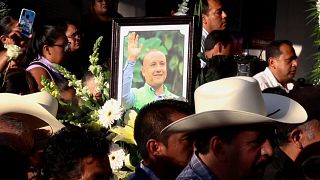Mexico
On stage, Mexican rapper Carlos CGH brings his vision of the Indigenous Triqui culture to life.
While performing at a celebration of Indigenous peoples in the heart of Mexico City in early August, he seamlessly wove Spanish verses with rhymes in Triqui, his mother tongue.
The rapper — whose full name is Carlos Guadalupe Hernández — aims to conserve his native language through contemporary rap.
Triqui is one of many Mixtec languages spoken in Oaxaca and has four variants.
One variant, Xnánj nu' a, is particular to Guadalupe's hometown of San Juan Copala.
Guadalupe, 24, opened the show wearing a black and red “gabán," a garment native to the Triqui people in western Oaxaca that is reserved for special occasions.
The Indigenous Triqui people, numbering about 20,000, have struggled with political and social conflicts going back more than 80 years.
The area also has become a hot spot for arms trafficking, drug trafficking and illegal logging.
Growing internal disputes for territorial control, including dozens of killings, have led to forced displacement for many in the community.
Many Triquis have moved to Mexico City but push to return to their homes.
Guadalupe is originally from the municipality of Santiago Juxtlahuaca, which many Triquis were forced to leave.
At the age of 6, he relocated to another Oaxacan city, Huajuapan de León, about two hours away.
He got his start in music at age 12 as a percussionist with a local band, surrounded by Oaxaca-Mixteca artists he admired.
He started rapping in 2013, inspired by the local scene. "Like love at first sight,” he recalled after seeing local lyricists perform.
He sees rap as a way to conserve his mother tongue.
With about a dozen Indigenous languages, Oaxaca has nurtured a diverse scene.
Among Guadalupe's peers are rappers who take pride in rapping in Mixtec, Zapotec, Cuicatec and other languages.
But the scene has suffered from the violence in Oaxaca. Last month, Rosty Bazendu, a passionate lyricist in the Zapotec language, was killed.
“When you look up the Triqui community on the internet, a lot of things are going to come up regarding the things that are commonly known about us, which are some of the problems we have,” Guadalupe said.
“I don't get too much into those topics, but I come here to talk about what’s within my community — the celebrations, the craftsmanship, the children, everyone who has stood out.”
His last song, dedicated to the people of Santiago Juxtlahuaca, opened with playful arrangements of traditional Oaxacan banda music.
The crowd cheered for “El Baile del Diablo,” or “Devil's Dance,” a traditional dance from the Oaxacan coast.
"I will never forget my culture, tradition and language," Guadalupe said with pride at the end.











Go to video
Exhibition in Morocco explores a world of color
Go to video
Hip-hop gains ground in Congo's Pointe-Noire
00:55
Jay-Z, Diddy rape accuser can remain anonymous in sexual assault lawsuit
01:26
Tens of thousands rally in New Zealand in support of Māori rights
01:00
Chidimma Adetshina crowned Miss Universe Africa and Oceania
01:00
Sean 'Diddy' Combs faces new sex assault allegations in woman's lawsuit